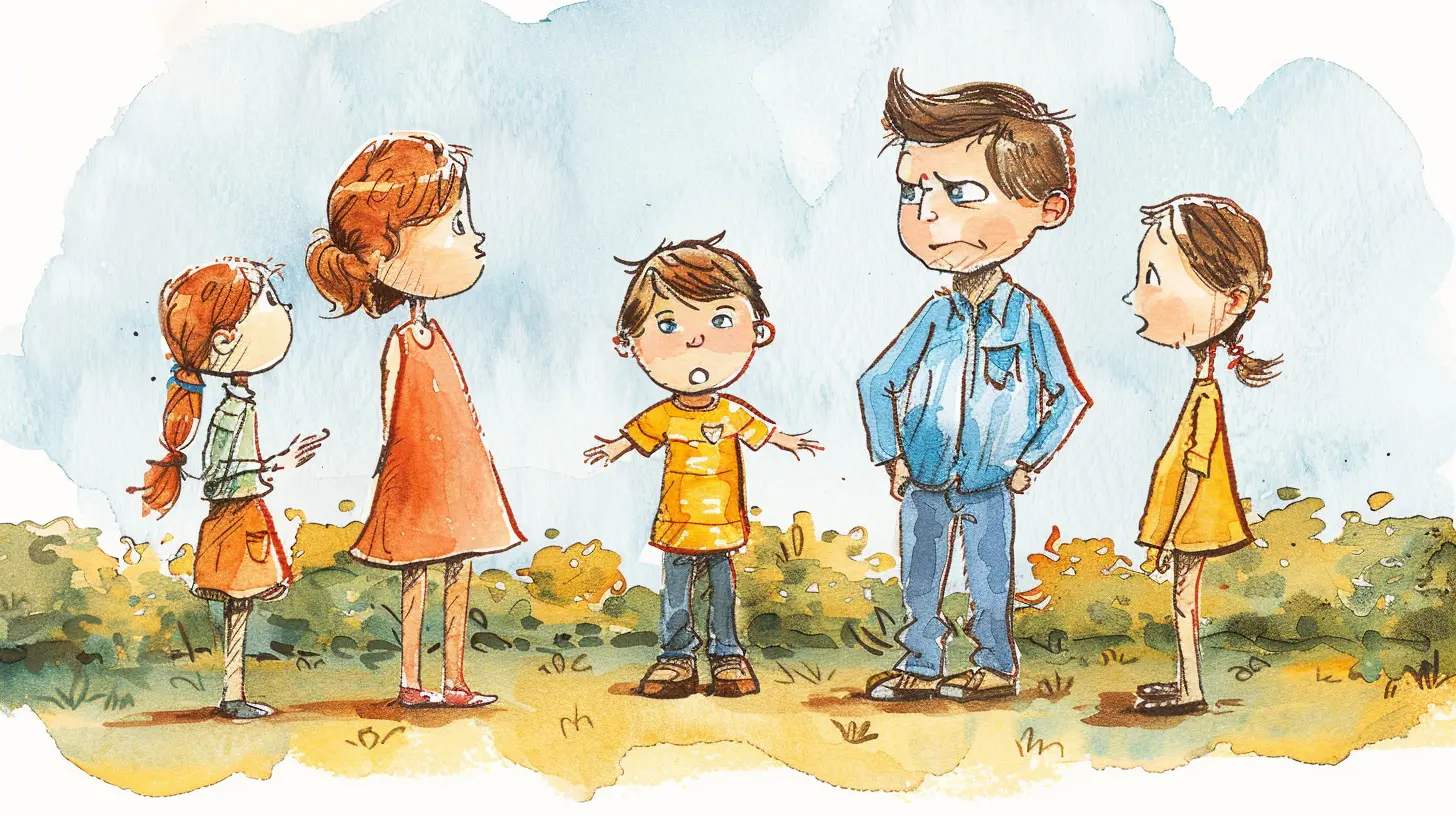How to Encourage Cooperation Without Yelling
14 July 2025
Let’s be honest—getting kids to listen without raising your voice can feel like trying to nail Jell-O to the wall. When you're running on little sleep, your patience is fried, and your toddler just dumped cereal all over the couch, it’s almost instinct to yell. But the truth is, yelling might grab attention in the short-term, but it doesn't build long-lasting cooperation. If anything, it can create fear, resentment, and a power struggle.
So how do you get your kids on board, without going full-on Hulk mode? Good news! You can encourage cooperation in a way that feels calm and connected rather than chaotic and confrontational. Let’s break it down, step-by-step, heart-to-heart.
Why Yelling Doesn’t Really Work
Before we tackle alternatives, it’s worth understanding why yelling fails to get lasting results.Yelling often works... temporarily. It triggers a fear response. But kids aren't learning why they should behave a certain way—they’re just reacting to the volume. Over time, they may tune you out or become anxious. Yelling can damage self-esteem, strain the parent-child bond, and actually increase misbehavior. Yep, the very thing you're trying to stop!
So what’s the secret sauce for lasting cooperation? Connection. Kids are more likely to follow the lead of someone they feel safe with and connected to.
Step 1: Connect Before You Correct
Imagine this: someone storms into your space, points a finger, and starts barking orders. How motivated are you to cooperate? Not very, right?Kids are no different.
Before making a request, take a moment to connect. That may look like:
- Getting down at their eye level
- Using their name
- Touching their shoulder gently
- Making eye contact
Try saying something like, _"Hey buddy, I can tell you’re having fun with your blocks. Can you help me clean up before dinner?"_ That moment of warmth and connection sets a cooperative tone.
Step 2: Ditch Commands, Use Choices
Let’s face it—everyone wants a say, even kids. It’s not about letting them run the show but offering limited choices that allow them to feel a sense of control.Instead of saying, _“Put on your shoes now!”_, try:
- _“Do you want to wear your red sneakers or the blue ones?”_
- _“Would you like to brush your teeth before or after pajamas?”_
It’s still your agenda, just wrapped in a kid-sized package.
Step 3: Be Clear and Simple
If your directions start sounding like a TED Talk, chances are your little one stopped listening after the first sentence.Keep it short and crisp:
- Instead of: _“Okay, I need you to pick up your toys, put on your pajamas, and stop running while I get dinner ready.”_
- Try: _“Please put your toys in the basket first.”_
One task at a time. Then praise each step. That micro-success builds motivation and trust.
Step 4: Use Playfulness to Invite Cooperation
Yep, play. It’s basically a cheat code for parenting. When things get tense, a little goofiness can melt resistance faster than a meltdown.Want them to hop into the car? Become a silly robot: _“Must get tiny human into vehicle… beeeep!”_
Trying to clean up toys? _“Let’s see who can fill the bucket the fastest!”_
Kids live in a world of imagination. If we meet them there, cooperation often follows naturally.
Step 5: Validate Feelings Before Redirecting
Sometimes we skip straight to consequences or corrections and completely bulldoze their emotions. But young kids, especially, need to feel seen before they can shift gears.Instead of saying, _“Stop whining and pick up your toys!”_, try:
- _“I see you’re upset. You really didn’t want to stop playing. That’s tough.”_
Pause. Let the feeling have space.
Then gently guide: _“We can play again tomorrow. Right now, it’s clean-up time. Can you help me put these in the box?”_
This keeps the emotional bridge intact.
Step 6: Set Clear Boundaries—Calmly
Cooperation doesn’t mean being a pushover. Kids need clear boundaries, but they also need those boundaries to come without anger.Say it once, with calm confidence.
- _“It’s time to leave the park now.”_
- _“The rule is no hitting.”_
- _“We brush teeth every night, no exceptions.”_
When you say it calmly and mean it, kids feel safe—even when they push back. Consistency is a quiet superpower here.
Step 7: Replace “No” With What They Can Do
Always saying “no” can feel restrictive and frustrating for kids. Try flipping the script and describing what is allowed.Instead of, _“Don’t run inside!”_, say:
- _“You can run when we go outside.”_
Swap _“Stop yelling!”_ with:
- _“Let’s use our quiet voice like this...”_
This subtle shift guides behavior without making kids feel shut down.
Step 8: Create Routines That Support Cooperation
Kids thrive on predictability. When they know what to expect, transitions become so much smoother.Set up a rhythm for the day:
- Morning routine: wake up, potty, breakfast, get dressed
- After-school routine: snack, playtime, homework
- Bedtime routine: bath, pajamas, story, sleep
You can even make visuals or charts for younger children. When routines do the talking, you don’t have to.
Step 9: Praise Progress, Not Perfection
Positive reinforcement goes a long way. And it’s most effective when it focuses on effort and progress—not just outcomes.Try:
- _“I saw how you helped your sister clean up—that was kind!”_
- _“You remembered to hang your backpack today, nice job!”_
- _“You stopped playing right when I asked. That showed great listening.”_
This builds a strong inner voice they’ll carry with them.
Step 10: Take Care of You, Too
Let’s be real—it’s hard to stay calm when you're running on fumes.Taking care of your emotional well-being isn’t selfish. It’s essential. That might mean:
- Getting rest (as much as possible)
- Taking a walk
- Asking for help
- Saying no to that third obligation this week
When you feel centered, it’s so much easier to parent from a place of connection instead of chaos. You don’t have to be perfect—just present.
Troubleshooting Common Scenarios
Let’s talk real-life moments and how to handle them without yelling.Scenario 1: The Morning Rush
Your kid is dragging their feet, and you’re already late.Try this:
- Connect: _“Mornings can feel rushed, huh?”_
- Offer choice: _“Do you want to put on your shoes first or your coat?”_
- Add play: _“Let’s race to the car! First one there gets to pick the music!”_
Scenario 2: Meal-Time Meltdown
They refuse to eat anything except crackers. Again.Instead of yelling:
- Validate: _“You’re not in the mood for broccoli, huh?”_
- Offer control: _“Would you like to dip it in ketchup or eat it plain?”_
- Keep boundaries: _“This is what’s for dinner. If you’re hungry later, we’ll save your plate.”_
Scenario 3: Sibling Battles
They’re going full WWE in the living room.Avoid diving in with volume.
- Separate gently: _“Let’s take a break.”_
- Reflect: _“It looks like you both wanted the same toy.”_
- Problem-solve: _“How can we take turns?”_
Final Thoughts: Planting Seeds of Cooperation
Encouraging cooperation without yelling isn’t about being passive or permissive. It’s about parenting with intention. It’s about being the calm in their chaos, the guide on their side.It’s not always easy. You’ll still have messy moments, sensory overload, and days where nothing seems to work. But every time you choose connection over control, you’re reinforcing trust—and that’s the real foundation of cooperation.
The goal isn’t raising perfect kids. It’s raising humans who feel heard, respected, and capable of navigating life with empathy and kindness.
When in doubt? Take a breath, soften your voice, and meet your child where they are.
Because in the end, cooperation grows in the soil of connection, not control.
all images in this post were generated using AI tools
Category:
Positive DisciplineAuthor:

Karen Hurst
Discussion
rate this article
2 comments
Edith Wyatt
Gentle words, big results!
November 8, 2025 at 4:41 AM

Karen Hurst
Thank you! I'm glad you found the message impactful. Gentle communication truly can lead to positive outcomes.
Russell Kirkland
Great tips! Fostering cooperation gently really transforms the parent-child dynamic positively.
July 20, 2025 at 4:18 AM

Karen Hurst
Thank you! I appreciate your thoughts on fostering a positive parent-child dynamic.


